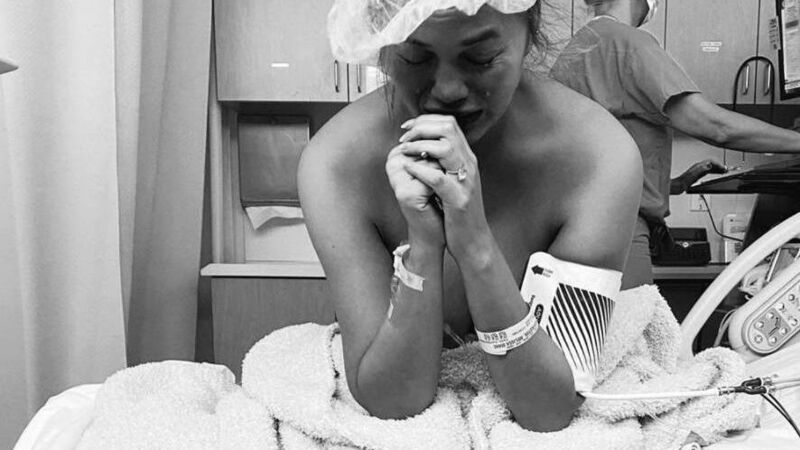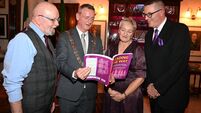Let’s talk about the heartbreak of losing a baby...

Chrissy Teigen shared the devastating news of her miscarriage through a statement on social media. Photo: Instagram @chrissyteigen
THE pain of losing a baby is indescribable. Yet it’s a heartbreak that blights the lives of so many parents every year — and some may never even find out why their precious baby died.
Baby Loss Awareness Week (babyloss-awareness.org) runs from October 9 to 15.
To mark the week this year, a new book, , has been published by Sands in the UK, and writer Susan Clark. The book features the moving stories of many families who’ve lost babies, and offers support and guidance to help families cope with the tragedy.

“The pain after a baby dies is raw, traumatic, devastating - people shy away from being near such strong emotions even if it’s their own families and friends who are suffering,” says the chief executive of Sands, Dr Clea Harmer.
“To protect themselves, many people choose not to think about or talk about something that feels so difficult.”
Here Harmer discusses the pain of baby loss and why more awareness is needed...
“Death is a very difficult topic to talk about, even when it’s the death of someone who’s lived a full life,” says Harmer.
“But when death touches birth, it becomes so difficult that many people just pretend it doesn’t happen.
“This is the basis of a taboo - it’s such a difficult and painful subject that it’s avoided, and as a result it becomes hidden, with bereaved parents feeling isolated and invisible.
“It’s not the natural order of things - birth should be a time of new life and new beginnings.

“The birth of a baby is looked forward to, and when the birth is a death, or death quickly follows, it feels so unnatural that it’s difficult to think about or talk about.
“As people don’t talk about the fact that babies die, it’s not something that’s known about, and despite the fact that 14 babies die every day in the UK, many people aren’t aware this happens.
“Shared memories are often a way people cope with death and grief. When a baby is stillborn or dies shortly after birth, there are very few memories even for the parents, and almost no shared memories.”

“The book has been written to try and break the taboo by openly speaking about the issues around baby death and pregnancy loss,” explains Harmer.
“Bereaved parents and families often feel invisible and alone in their grief, sometimes believing they are the only ones to have experienced the death of a baby and battling with confusion and isolation.
“A book like this allows parents and families to see they’re not alone, that sadly there are many others who’ve experienced what they’ve experienced.”
She says the awareness week helps bereaved parents and their families unite with others throughout the world to commemorate their babies’ lives, raise awareness about pregnancy and baby loss, and push for improvements in both care and support for those affected and for the prevention of pregnancy and baby loss.
“We’re highlighting the isolation many people feel after pregnancy or baby loss,” says Harmer.
“The effect of social distancing from Covid-19 has had a major impact on access to care and support and has complicated grief and responses to pregnancy and baby loss. We want to let those affected by pregnancy and baby loss know they’re not alone and that we’re all here to support them.”
Harmer suggests five ways you can help someone whose baby has died:
When someone’s baby has died it can be hard for others to find the words to say. This can add to feelings of isolation, so simply saying how sorry you are can really help. Say the baby’s name if you know it; if you don’t then ask. Ask them if they’d like to tell you about the baby.
A simple text, card or e-mail goes a long way. If you know them well, you could call them and ask how they are.
When a baby dies it can be very hard for parents to do everyday tasks such as walking the dog, shopping or cleaning. Offer to help in a practical way.
If a colleague’s baby has died you may want to let them know how sorry you are. If you’re an employer, find out how best to support your staff.
Anyone affected by the death of a baby can get information and support from the Sands website, (sands.org.uk)
To find supports in Ireland log onto https://pregnancyandinfantloss.ie/
Loving You From Here: Stories of Grief, Hope and Growth When a Baby Dies by SANDS with Susan Clark is published by Yellow Kite







 App?
App?


